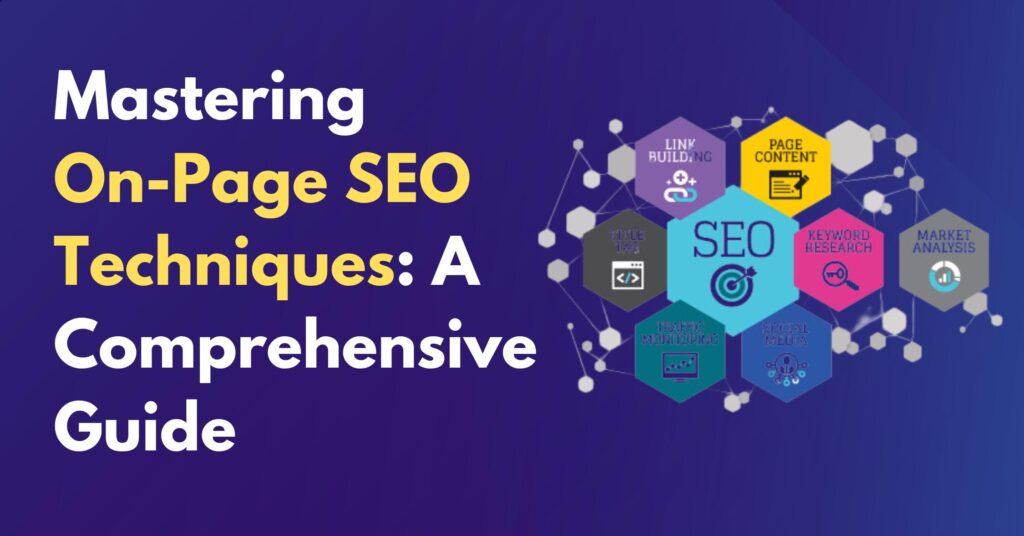Welcome to our comprehensive guide on SEO optimization techniques. If you’re looking to increase your website’s online visibility and attract more traffic, you’ve come to the right place. In this guide, we will cover everything you need to know about SEO optimization, from keyword research to on-page optimization, link building, and more. By the end of this guide, you will have a clear understanding of the best practices and strategies to help you take your SEO game to the next level.
Key Takeaways:
- Keyword research is a crucial foundation for any successful SEO campaign.
- On-page optimization plays a crucial role in elevating your website’s performance in search rankings.
- Backlinks are essential for establishing your website’s authority and credibility.
- Staying up-to-date with SEO trends and updates is vital to stay ahead of the competition.
Understanding the Importance of SEO
Before we dive into the various SEO optimization techniques, let’s first understand why optimizing your website for search engines is crucial for your online success. Search engine optimization (SEO) is the practice of optimizing your website to rank higher in search engine results pages (SERPs). This process involves both on-page and off-page techniques that help search engines understand the relevance and value of your website content.
One of the key aspects of SEO is on-page optimization, which involves optimizing your website’s content and structure to make it search engine-friendly. By improving your website’s on-page elements, such as meta tags, headings, and URL structure, you can make it easier for search engine crawlers to understand the content and rank it accordingly.
On-page SEO also plays a significant role in improving user experience, as it helps users navigate your website more easily and find the information they’re looking for quickly. By providing a seamless user experience, you can reduce bounce rates and improve engagement, which ultimately helps boost your website’s search engine rankings.
Conducting Effective Keyword Research
Keyword research is the backbone of any successful SEO optimization technique. It involves finding the most relevant and valuable keywords that people use to search for products or services like yours. By pinpointing these keywords, you can optimize your content for on-page SEO, enhance your visibility on search engines, and attract targeted traffic to your website.
To conduct effective keyword research, you need to use tools and methodologies that help you identify high-value keywords. Some of the best keyword research tools include Google Keyword Planner, Ahrefs, SEMrush, and Moz. You can also use Google Search Console to evaluate your site’s performance and the keywords and phrases that drive traffic to your site.
When doing keyword research, consider factors like search volume, keyword difficulty, and relevancy to your website. Opt for long-tail keywords, which are specific phrases with lower search volumes but higher conversion rates. Use these keywords to optimize your webpage titles, meta descriptions, and content for on-page SEO.
Effective keyword research is a continuous process that involves constant analysis, testing, and adjustment. By staying on top of keyword trends, you can refine your content strategy, attract the right audience to your website, and achieve long-term SEO success.
Crafting Compelling Content
When it comes to SEO optimization techniques, content is at the forefront. Creating engaging, unique, and keyword-rich content enables search engines to crawl your page effectively and provides value to your audience. Optimizing your content is key to ranking high in search engine result pages.
Here are some tips for crafting compelling content:
- Research your audience: Understanding your target audience is crucial to creating content that resonates with them. Use buyer personas, social media analytics, and website analytics to learn more about your audience.
- Perform in-depth keyword research: Keyword research provides insights into the words and phrases your audience uses when searching for your product or service. Use tools like Google Keyword Planner and SEMrush to find the right keywords to target.
- Create valuable content: Your content should provide value to your audience. Use storytelling, infographics, and other multimedia elements to make your content engaging.
- Write compelling headlines: Your headlines should grab the audience’s attention and highlight the main content of the piece. Use power words and numbers to make your headlines stand out.
- Use subheadings: Subheadings make your content scannable, making it easier for your audience to find the information they need. Use H3 tags to create subheadings.
- Optimize your content: Include your target keywords in the content, meta tags, and headings. Avoid keyword stuffing, as it can hurt your site’s ranking.
By crafting compelling content that meets the needs of your audience, you can increase engagement and drive traffic to your website.
Optimizing On-Page Elements
Maximizing On-Page SEO elements is a fundamental way of enhancing your website’s search engine rankings. Before we start our in-depth analysis, let’s quickly review what On-Page SEO is all about.
What is On-Page SEO?
On-Page SEO involves optimizing the content of your website pages, including images, meta tags, headings, and URL structure. By optimizing these elements, search engines can understand the content of your website better, which helps improve your search engine ranking position.
The Key Elements of On-Page Optimization
There are four key elements that you need to optimize for effective On-Page SEO:
- Meta Tags: They provide a description of your page and help search engines understand its content. Ensure your meta tags are concise, accurate, and keyword-rich.
- Headings: They break down the structure of your page, and search engines like Google give more weight to content in headings. Use relevant H1, H2, and H3 tags in your page content.
- URL Structure: A clear and descriptive URL can help search engines understand your page’s content. Incorporate relevant keywords into your URL and use hyphens between words.
- Images: Optimize the size, alt tags, and relevant filename of your images. This ensures faster page load times, better user experience, and improved rankings.
Building High-Quality Backlinks
Backlinks play a crucial role in improving your website’s authority and credibility in search engine rankings. However, it is not enough to acquire any backlink; you need high-quality backlinks from authoritative websites in your niche.
So, how can you attract these valuable links? Here are some effective strategies to get you started:
1. Create High-Quality Content
One of the best ways to attract high-quality backlinks is to create engaging, informative, and unique content. With valuable content, other websites will naturally want to link back to your site as a resource for their audience.
2. Guest Posting
Guest posting is another useful strategy to build high-quality backlinks. By reaching out to authoritative websites in your niche and contributing valuable content, you can earn links back to your site that can improve your website’s rankings.
3. Broken Link Building
Broken link building involves finding broken links on other websites and suggesting your website as a replacement. By offering a solution to a broken link, you can earn a valuable backlink while helping another website improve user experience.
4. Influencer Outreach
Identify influencers in your niche and reach out to them for collaboration opportunities. By working with influencers, you can earn high-quality backlinks from their website or social media profiles, increasing your website’s visibility and credibility.
TIP: Avoid black hat methods, such as buying links or participating in link farms. These tactics can harm your website’s rankings and credibility, ultimately causing more harm than good.
By implementing these strategies, you can attract high-quality backlinks that can boost your website’s rankings and improve your online presence. Remember to focus on creating valuable content and building relationships with authoritative websites in your niche.
Leveraging Technical SEO
Optimizing your website’s technical elements can significantly impact its visibility and crawlability by search engines. It involves making modifications to the site’s backend structure or server configuration.
Here are some essential SEO optimization techniques that can help enhance your website’s technical performance:
1. Improve website speed:
A slow website can negatively affect user experience and search engine crawl rates. Use tools like Google PageSpeed Insights or GTmetrix to analyze your website and identify performance bottlenecks, such as unoptimized images or inefficient code.
2. Optimize website structure:
Ensure your website has a clear hierarchy and logical structure, making it easier for search engines to crawl and index content. Use descriptive URLs and well-structured HTML code.
3. Use header tags:
Header tags (e.g., H1, H2) help structure your content and create a hierarchy that search engines can understand better. Use them to highlight essential topics or themes on your website.
4. Mobile optimization:
More than half of all internet traffic comes from mobile devices today. Optimize your website for mobile devices using responsive design, which automatically adjusts the layout according to the user’s screen size.
Tip: Implement Accelerated Mobile Pages (AMP), a Google-led initiative that makes mobile web pages load faster.
5. Implement structured data:
Structured data markup is a technical technique that helps search engines understand the content and context of your website better. Implement structured data for important data points such as business information, reviews, and product details to improve your search engine results.
By leveraging these essential technical SEO optimization techniques, you can help search engines crawl your website more efficiently, improve your website’s performance, and enhance your search engine results pages’ visibility.
Harnessing the Power of Local SEO
For businesses with a physical location, local SEO techniques should be a top priority. Optimizing for local search ensures your website appears on search engine results pages when potential customers search for businesses in your area.
The key to effective local SEO is to focus on local keywords. Use location-based keywords in your website content and metadata, such as city or neighborhood names. This can help your website appear higher in search engine results for local queries.
Another crucial factor in local SEO is having accurate and consistent business listings across different platforms. This includes Google My Business, Yelp, and other directories. Make sure your business name, address, and phone number (NAP) are consistent on all platforms. This can increase your website’s visibility and credibility in local searches.
Localized Content
Creating localized content can also help boost your website’s rankings in local searches. This includes blog posts or pages that have location-specific information or references. You can also create location-based landing pages with optimized content and calls to action for specific areas or neighborhoods.
Reviews and Reputation Management
Reviews and reputation management are also essential for local SEO. Encourage customers to leave reviews for your business on platforms like Google My Business and Yelp. Positive reviews can improve your website’s visibility and attract more customers. Responding to negative reviews in a professional and timely manner can also help improve your online reputation.
| Key Takeaways: |
|---|
| Optimize for local keywords in your website content and metadata. |
| Ensure accurate and consistent business listings across different platforms. |
| Create localized content to boost your website’s rankings in local searches. |
| Encourage customer reviews and manage your online reputation for improved visibility. |
By implementing these local SEO techniques, you can attract more customers from your local area and outperform your competitors in local searches.
Expanding Your Reach with Social Media SEO
Social media isn’t just a platform for engagement. Appropriate social media strategies can be leveraged to enhance a website’s search engine rankings and lead to increased traffic. Social signals like likes, shares, and comments, can be a great source of new traffic and backlinks. By optimizing your content and profiles on social media, you can enhance your website’s visibility and reach.
To optimize your social media profiles, use keywords in your bio, description, and posts. When you publish a new post or page, immediately share it on social media and include relevant hashtags. Engage with your audience by replying to their comments and resharing their posts. Avoid too much self-promotion, and instead focus on creating value for your audience.
In addition to optimization, social media can be used to build relationships with influencers and other industry professionals. Collaborating with them can lead to valuable backlinks, social shares, and increased traffic.
The Benefits of Social Media on SEO
Social media activity increases website credibility and builds brand awareness. The more social media presence a website has, the more likely the search engines will see it as a credible, authoritative source and reward it with higher search engine rankings. In addition to this, social media platforms are operated on user-generated content. Therefore, this will attribute to the generation of high-quality backlinks that will increase the website’s ranking further.
“The more people share your content on social media, the more valuable it becomes to the search engines, resulting in higher rankings.”
By actively involving social media in the SEO optimization techniques, it essentially creates a strong online presence with a broader outreach, generating an improved ranking for websites.
Measuring and Analyzing SEO Success
Effective measurement and analysis are essential to refine and optimize your SEO efforts. This involves tracking key performance indicators to understand where you stand in the SERPs and how you can improve. Here are valuable tips for measuring and analyzing SEO success.
Track Your Keyword Rankings
One way to assess SEO progress is by monitoring keyword position over time. Use online tools to track keyword rankings and assess where you stand in the search results compared to competitors. Additionally, leverage this data to identify high-potential keyword targets and expand your reach.
Monitor Traffic Metrics
Monitoring traffic metrics is crucial to understand website performance and identify opportunities. Key indicators include traffic volume, bounce rates, user engagement, and conversion rates. By interpreting these analytics, you can improve website functionality and user experience to enhance SEO success.
Assess Backlink Profile
Assessing the quality of your website’s backlinks is an essential component of SEO analysis. Analyze the quantity, quality, and relevance of backlinks to determine their impact on search engine rankings. By monitoring backlink data, you can create a more accessible methodology for improving your website’s backlink profile.
Use Google Analytics
Google Analytics is a critical tool for understanding website performance and SEO optimization techniques. Use it to monitor detailed metrics, such as traffic sources and user behavior to optimize your website’s usability, target key demographics, and ultimately improve your conversion rate.
To sum up, measuring and analyzing your SEO success is key to refining your optimization strategies and achieving your business goals. By regularly assessing key performance indicators and using analytics tools effectively, you can ensure that your SEO strategies remain competitive and evolve over time.
Staying Up-to-Date with SEO Trends
As SEO is an ever-evolving field, marketers must stay on top of the latest trends and updates. Don’t get left behind by relying on outdated strategies.
One way to stay up-to-date is by following industry leaders and reputable sources on social media platforms. Twitter is an excellent resource for keeping tabs on the latest algorithms, best practices, and Google updates. Reliable Facebook groups such as the SEO Signals Lab are also worth joining to stay informed about any significant SEO changes.
Another way to keep up with SEO trends is by attending conferences, webinars, and workshops. Not only will you stay abreast of the latest SEO techniques and strategies, but you’ll also have an opportunity to network with other professionals in the field.
Finally, subscribing to reputable SEO blogs such as Moz, Search Engine Land, and Ahrefs can help you stay up-to-date with the latest updates and trends in the SEO industry.
With the ever-changing landscape of SEO optimization techniques, it’s vital to stay current and adapt quickly to improve your website’s search engine rankings.
Conclusion
SEO optimization techniques are essential for improving your website’s online presence. By implementing the strategies outlined in this guide, you can take your website to new heights and attract more traffic. Remember to conduct effective keyword research, craft compelling content, optimize your on-page elements, build high-quality backlinks, leverage technical SEO, and stay current with SEO trends.
Measure your progress regularly by analyzing key SEO metrics, and always strive to improve. Your dedication to mastering SEO optimization techniques will pay off in the long run, resulting in higher rankings, increased traffic, and ultimately, achieving your business goals.
FAQ
What are SEO optimization techniques?
SEO optimization techniques are strategies and tactics employed to improve a website’s performance in search engine rankings and increase organic traffic. These techniques include on-page optimizations, keyword research, content creation, backlink building, technical optimizations, and more.
Why is SEO optimization important for my website?
SEO optimization is crucial for your website’s success as it helps improve its visibility in search engine results pages (SERPs). By implementing effective SEO techniques, you can attract more organic traffic, increase your website’s authority and credibility, and ultimately achieve your business goals.
What is on-page SEO?
On-page SEO refers to the optimization of various elements within a webpage to improve its visibility in search engine rankings. This includes optimizing meta tags, headings, URL structure, content, and other on-page factors to make it more search engine-friendly and user-friendly.
How can I conduct effective keyword research?
Effective keyword research involves using specialized tools and methodologies to identify high-value keywords that are relevant to your website and have the potential to drive targeted traffic. Keyword research helps you understand what your target audience is searching for and allows you to optimize your content accordingly.
How do I create compelling content for SEO?
Creating compelling content for SEO involves producing high-quality, informative, and engaging materials that resonate with your audience and incorporate relevant keywords. By creating content that offers value to your readers and aligns with search engine guidelines, you can improve your website’s visibility and attract organic traffic.
What are the key elements to optimize for on-page SEO?
The key elements to optimize for on-page SEO include meta tags (title and description), headings (H1-H6), URL structure, internal linking, alt tags for images, and keyword optimization within the content. By optimizing these elements, you can improve your website’s visibility and search engine rankings.
How do I build high-quality backlinks?
Building high-quality backlinks involves various strategies such as creating valuable content that others naturally want to link to, outreach to relevant websites and influencers in your industry, guest blogging, participating in online communities, and leveraging social media platforms. Quality backlinks from authoritative sources can significantly improve your website’s search engine rankings.
What is technical SEO?
Technical SEO refers to the optimization of your website’s technical aspects to improve its crawlability, indexability, and overall performance in search engines. This includes optimizing factors such as website speed, mobile-friendliness, URL structure, XML sitemaps, structured data, canonical tags, and more.
How can I optimize my website for local SEO?
To optimize your website for local SEO, you can start by creating and optimizing a Google My Business listing, targeting location-specific keywords, including your business’s address and phone number on your website, obtaining online reviews, and ensuring consistent NAP (name, address, phone number) information across platforms.
How can I leverage social media for SEO?
You can leverage social media for SEO by optimizing your social media profiles, sharing your content on social platforms, encouraging social sharing of your website’s content, and engaging with your audience. Social signals can indirectly impact your website’s search engine rankings and help increase its visibility.
How do I measure and analyze SEO success?
Measuring and analyzing SEO success involves tracking key metrics such as organic traffic, keyword rankings, backlinks, conversion rates, and user engagement. You can utilize analytics tools like Google Analytics and Google Search Console to gain insights into your website’s performance and make data-driven decisions.
How can I stay up-to-date with SEO trends?
To stay up-to-date with SEO trends, you can follow reputable industry blogs, attend webinars and conferences, join SEO communities and forums, subscribe to newsletters and podcasts, and continuously learn and experiment with new strategies. Staying informed about the latest updates and trends in SEO ensures that you remain competitive in the ever-evolving digital landscape.











1 Comment
I’m grateful. I have been searching for information about this topic for a while, and yours is the best that I have discovered thus far. However, what about the revenue? Regarding the supply, are you sure?